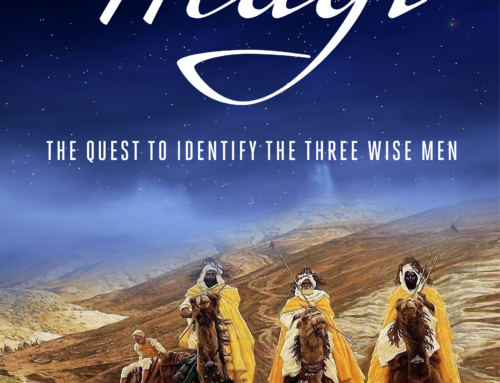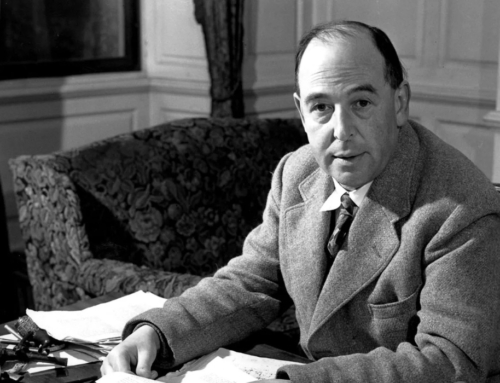Today’s blog post is an excerpt from my new book Beheading Hydra – A Radical Plan for Christians in an Atheistic Age.
Rusty Reno’s recent book The Return of the Strong Gods catalogues the concerted effort after the second world war of philosophers, political thinkers, economists and theologians to exterminate dogma. They looked at the legacy of war, revolution and political chaos in Western culture over the last five hundred years, and concluded that the chaos was caused by people fighting over dogma—political ideologies and economic dogma, but most of all religious dogma.
To establish peace, they decided, dogma must go. Their theory did not come out of nowhere. When you look at the philosophical development over the last five hundred years, everything was going in that direction anyway. Materialism gave way to scientism and empiricism which gave way to Deism which yielded to atheism. It was a slam dunk. Relativism must follow from atheism. If there is no invisible dimension to reality, then there could be no God, and if there is no God, then it’s obvious: there could be no divinely revealed dogma.
Furthermore, if there was no divinely revealed religious dogma, then a God-given moral code was also no more than a cultural phenomenon—a human invention. The anthropologists and students of comparable religion came to conclusions which complemented the idea. As they studied the array of world cultures, they concluded that all the religions with their strange myths, superstitions, rituals, dogmas and moral codes were merely humanly invented cultural artifacts and Christianity was just one among many.
Religion Without Dogma?
Christian theologians also jumped on the “let’s get rid of dogma” train. In addition to Protestant theologians, Reno shows how Catholic theologian Karl Rahner pioneered a dogma free “anonymous Christianity” in which atheists and non-believers could be saved because they were well intentioned, nice people. Along with this warm, fuzzy theology, there was a new open-ness, reaching out to the marginalized, “breaking down barriers and overcoming binaries.”
These trends sat comfortably with the emerging ecumenical and inter-faith movement in the second half of the twentieth century. If the dogma could be dumped, the divides could be bridged. The Christian ecumenists realized that getting rid of dogma completely would not fly, so (remembering that dogma only came out of particular historical circumstances and culture anyway) the dogma was to be “re-interpreted” for a modern age.
Dogma Free Catholicism?
This de-emphasis on dogma is clear in the motivation for the Second Vatican Council. Instead of “dogma which divides” the emphasis would be on the pastoral. Catholic theologians and prelates did not deny Catholic dogma. Instead they stressed the pastoral application of Catholic beliefs and reminded everyone that the particular applications in different cultures and different circumstances would reflect “pastoral sensitivities”.
The “pastoral approach” explains the present pope’s ambiguity on doctrinal matters. Pope Francis has never denied Catholic dogma. He simply doesn’t teach it or preach it. Instead he presents a Catholic faith that is a user friendly and flexible spirituality. He’s a Gumby pope.
The typical modernist approach therefore was not to deny the dogma, but to re-interpret it in such a way that it would be acceptable not only to all Christians, but as much as possible to all people. Whereas Catholics once understood church unity to be an invitation to Protestants to “come home to Rome” now ecumenism consisted of an agreed understanding of the re-interpreted Catholic dogmas— and this introduces the tenth head of Hydra: Indifferentism.
Indifferentism is the logical conclusion to relativism in religion. Put simply it is the idea that every Christian denomination is just a different expression of the same religion and every religion is of equal value. The indifferent Christian cries, “Surely all that matters is how much we love Jesus!” And the interfaith enthusiast chirps, “We are all climbing the same mountain but on different paths..and as we climb that mountain all the paths converge.”
However, while one Christian may love Jesus more than another, it is patent nonsense that all Christian denominations are of equal value. Catholicism is far richer in every aspect: philosophy, spirituality, culture, art, architecture, history, music. No matter what one’s prejudices are, it is historically and objectively true that Catholicism is the richest and fullest expression of Christianity. Bob the Baptist may very well be a good Christian man who loves Jesus, but his religion is a reduced and inferior form of Catholicism from which it is derived.
Likewise it is nonsense to say that all religions are of equal value. Some religions are superior to others. Chartres Cathedral is not on a par with some squalid voodoo hut. Shall we compare Michelangelo’s Pieta to Kali the Destroyer, and must we pretend that the terrifying religion of the Aztecs is as sublime as a Mozart Mass? Shall we equate the Sistine Chapel with your local megachurch in a renovated supermarket? Is an Alabama snake handler gospel meeting on a par with choral Evensong in Kings College Cambridge? I think not.
Indifferentism in religion only serves to weaken all religion, for when the dogma and the distinctive devotions go, all we are left with is vanilla spirituality. This is not a case of the blind leading the blind, but the bland leading the bland.
Overweight Materialism
In his 1946 essay, Religion Without Dogma? C.S.Lewis analyzes the fatal flaw of indifferentism and relativist religion. As he does, he also unlocks the underlying problem of the whole relativistic mindset on which the rejection of dogma rests.
Dogma is impossible, argues the materialist because there is no God to reveal the dogma. Religious truths are mere human inventions— the product of human thought. In fact, the thoroughgoing materialist must not only maintain that religious ideas are human inventions, but all ideas, moral precepts and philosophical concepts can be no more than human inventions. This leads us to ask, “If all ideas are mere human inventions where do the ideas come from? In other words, where does thought itself originate?
If there is only this material world, then thoughts and ideas are no more than chemical reactions in the brain as it processes data from the senses. Lewis asks how the human brain has this capacity. If the whole natural order is nothing more than a series of complex, irrational, random biological interactions (as the materialist holds) then the human brain is no more than a highly evolved, very complicated meaty computer. If materialism is true (and nature is no more than a result of random chemical reactions) then the human brain itself is no more than the result of random, irrational processes.
Lewis writes, “Every particular thought…is always and by all men discounted the moment they believe that it can be explained as the result of irrational causes. Whenever you know what the other man is saying is wholly due to his complexes or to a bit of bone pressing on his brain, you cease to attach any importance to it. But if [materialism] were true, then all thoughts would be merely the result of irrational causes. Therefore all thoughts would be equally worthless. Therefore [materialism] is worthless. If it is true, we can know no truths. It cuts its own throat.”
The same is true of relativism. If the idea that “there is no such thing as truth” comes from the human brain, and if the human brain is the result of random, irrational evolution, then the statement “there’s no such thing as truth” is also senseless.
But of course, we know certain statements are true not because they are true in the realm of ideas, but because first of all they are true in this physical world of reality. The philosopher proves the brick is real by kicking it and howling in pain.
The Scandal of Particularity
Another term for kicking the brick is “the scandal of particularity”. This theological jargon refers to the intellectual scandal caused by the incarnation of our Lord Jesus Christ. Put simply, it is intellectually respectable to be a Deist—to believe in the “The Creator”. It is also intellectually respectable to believe in God as “the Force” or “the cosmic energy”. Star Wars is a very respectable religion. This sort of god does what a god would do if you were inventing a religion. He remains where he belongs—up there in the spiritual realm. In other words, he remains an idea, a concept, a philosophical theory or an energy field.
But have you ever tried to imagine this great energy force—this spiritual being that flows in and through all things? When I try to imagine this all I come up with is images of strobe lights and electric current or else, as C.S.Lewis put it, “some vast tapioca pudding in the sky.” We’re physical beings. We have trouble trying to have a relationship with a vast tapioca pudding in the sky. We want particularity—something we can handle.
It is the corner stone of the Christian religion that this vast tapioca pudding—this energy force was also the Creator—the God of Abraham, Isaac and Jacob, and he was their God because he got involved in their lives. He was in a relationship with a particular tribe of nomads in the Arabian desert and then deemed to descend into human history and take human flesh of a peasant girl in Nazareth before going on to teach the truth, heal people, deliver them from bondage before dying and rising again to return to the invisible realm.
This is the “scandal of particularity”. It’s embarrassing. It’s incredible. It’s not intellectually respectable. Philosophers don’t like it. To think that the one God—the majestic Creator, the Divine Architect, the Great Father of All should become a mewling, man child! To think that he would come into a particular stable in a particular town in a particular province of a particular empire at a particular time on a particular day and that he would live a particular life and die on a particular cross on a particular hillside outside a particular city on a particular Friday afternoon.
It’s a scandal.
And yet, isn’t particularity necessary for any idea, thought or concept to become real? A Chopin nocturne only becomes real when it is recorded on particular notepaper then played by a particular body seated at a particular piano with particular fingers hitting particular ivory keys which strike particular steel wires to make particular sound waves that vibrate in particular ear drums of particular people.
An idea, thought or concept is only real once it becomes particular, and the Christian religion is only real because of the scandal of the particularity of the incarnation. God became man in place and time. In doing so God became real. He was no longer a theory he was a scandal of flesh and blood.
It is this same particularity that reveals the ridiculousness of relativism because relativism, by its very nature, can never be particular and therefore can never be real.
Furthermore, it is this particularity that demands not only a dogmatic religion, but a sacramental one. The religion of the incarnation must be dogmatic and sacramental because, like the incarnation, it is real. It must therefore be solid. It must be historical. It must be experienced. It is not just a theory.
Go here to purchase Beheading Hydra







Hi Father, I don’t know if I understand what is being said in paragraphs 6-8 under the heading “Dogma Free Catholicism?” and I was hoping you could clarify. Your line of thought seems to go straight from de-emphasizing dogma to Vatican II to Pope Francis to modernism. Does this thereby conclude that Pope Francis and Vatican II are inherently modernist?
I’m also unclear how Pope Francis “doesn’t teach or preach” dogma. I’ve read him regarding the Trinity, the Eucharist, male priesthood, abortion, care for the poor, etc. Don’t these fall under the dogmatic?
Thank you for the clarifications on these.
I would say the Second Vatican Council is influenced by the cultural and philosophical tendencies of modernism. In saying Pope Francis “doesn’t teach or preach dogma” I mean that this is not the keynote or main emphasis of his papacy and that his approach is always to emphasize the pastoral dimension. As I wrote, he does not deny dogma, but in the emphasis on the pastoral I think he de-emphasizes it. His teaching on the Trinity and the Eucharist and priesthood are rooted in the dogmatic. Care for the poor, abortion and other moral and social issues are more pastoral, but the dogmatic and pastoral must never be separated. The pastoral is the application of the dogmatic, and some of Francis’ critics believe that in some details his pastoral approach has undermined the timeless dogmatic and moral teaching of the church. It’s a tough one.
Hi Father, this is an older post but I’ve been reading a lot more Pope Francis lately, and came across a passage from 2015 which fits this conversation.
“Not infrequently a kind of opposition is constructed between theology and pastoral care, as though they were two opposing, separate realities, which have nothing to do with one another. Not infrequently we identify doctrine with the conservative, the retrograde; and, on the contrary, we think that pastoral care is an adaptation, a reduction, an accommodation. As if they had nothing to do with one another. Thus, we create a false opposition between the so-called “pastorally-minded” and the “academics”, those on the side of the people and those on the side of doctrine. We create a false opposition between theology and pastoral care; between the believer’s reflection and the believer’s life; life, then, has no space for reflection and reflection finds no space in life. The great Fathers of the Church, Irenaeus, Augustine, Basil, Ambrose, to name a few, were great theologians because they were great pastors.”
https://www.vatican.va/content/francesco/en/messages/pont-messages/2015/documents/papa-francesco_20150903_videomessaggio-teologia-buenos-aires.html
That hits exactly where my thoughts have been going, I just wasn’t able to articulate it well. Like you said in your last comment, “the dogmatic and pastoral must never be separated”. This sentiment agrees with Pope Francis. For dogma to be life-changing, it must be incarnated and applied. It seems that Francis’ so-called “pastoral” approach is an application of his dogmatic views (which he also articulates quite often, for those willing to go read his words). Care for the poor and abortion may not be “dogmatic”, but they are still a necessary part of salvation (Matthew 25, etc).
Just more thoughts I’ve been mulling for the past few months.